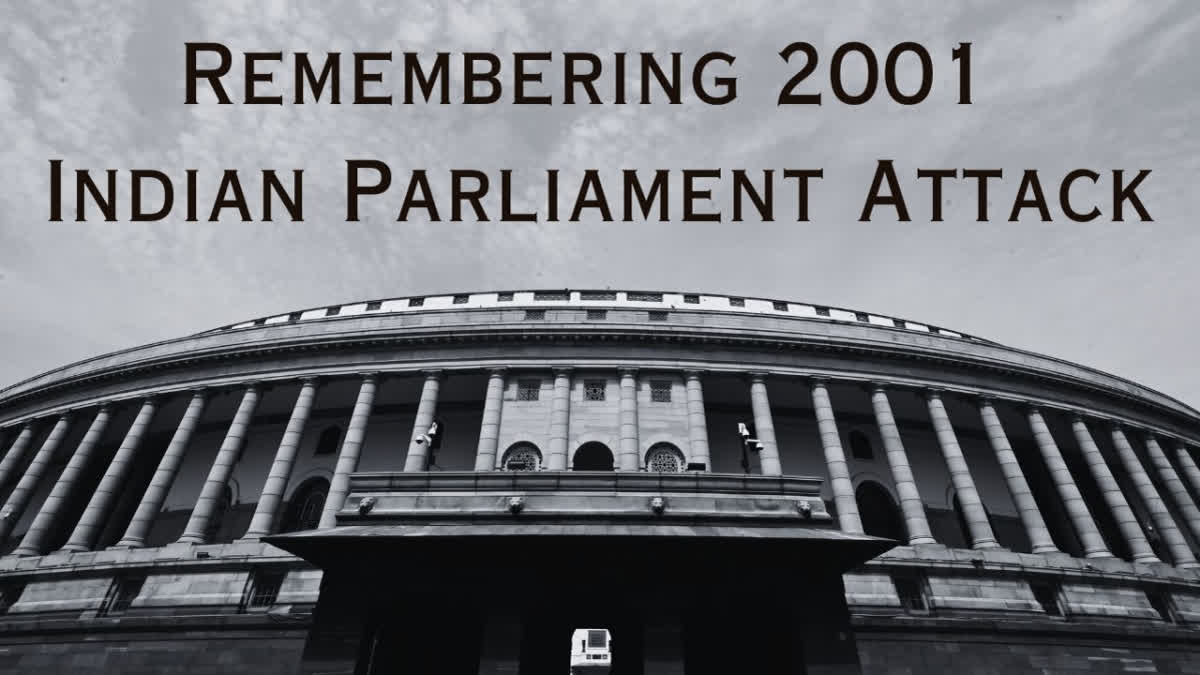Hyderabad: It has been 22 years since the Indian Parliament faced a distressing assault that shook the foundations of the nation's democracy. Terrorists, guided by Pakistan, led a brutal attack, claiming the lives of at least nine people, including six security personnel, two Parliament Security Service personnel, and a gardener. The incident, marked by both tragedy and heroism, remains etched in the collective memory of the nation.
The then Home Minister Lal Krishna Advani, addressing the Lok Sabha, remarked, "It is now evident that the terrorist assault on the Parliament House was executed jointly by Pakistan-based and supported terrorist outfits, namely, Lashkar-e-Taiba and Jaish-e-Mohammad.”
What all happened on that day?
On December 13, 2001, at around 11.30 am, the security breach at the Parliament Complex in New Delhi occurred as five heavily armed militants, driving a white ambassador, used fake VIP cards and a red beacon to infiltrate.
The intrusion took place around 40 minutes after the Parliament adjourned, with then Prime Minister Atal Bihari Vajpayee and Opposition Leader Sonia Gandhi having already left. Most of the 100 MPs, including Home Minister LK Advani, were inside the Parliament.
The terrorists' car hit the then Vice President, Krishnan Kant's motorcade, initiating an unplanned confrontation. A fierce hour-long firefight ensued between the terrorists and security personnel. Subsequently, all five terrorists opened fire with AK-47 rifles and hurled bombs. However, all the terrorists were eventually killed but also claimed the lives of five Delhi police personnel, including a Parliament security guard and a gardener.
Despite the chaos, all ministers and MPs were taken out unharmed, and the incident was broadcast live on television. One militant, laden with ammunition, detonated himself at the main entrance to the Parliament chambers.
The terrorists aimed to enter the building and indiscriminately target the crowd of MPs and ministers. Despite the relatively small death toll compared to events like the 26/11 Mumbai terror attack, this incident stood out for targeting the heart of Indian democracy.
The breach exposed inadequate security at the complex, urging the government to invest significantly in enhancing security measures. Further investigations linked Afzal Guru, SAR Geelani, Shaukat Hussain and Navjot Sandhu to the case.
What after that attack?
In the aftermath of the attack, the Delhi Police special cell cracked the case within 72 hours. The investigation revealed that the five terrorists forming the suicide squad were all Pakistani nationals, associated with the militant groups Lashkar-e-Taiba (LeT) and Jaish-e-Mohammed (JeM).
Mohammad Afzal Guru, a former JKLF terrorist, his cousin Shaukat Husain Guru, Shaukat’s wife Afsan Guru, and SAR Geelani, an Arabic lecturer at Delhi University, faced the legal consequences and were arrested. While Afsan was acquitted, Geelani was initially sentenced to death but later acquitted by the Supreme Court in 2005. Later, Afzal Guru was hanged to death in 2013.
The repercussions of the Parliament attack were not limited to the national capital, New Delhi. The incident almost pushed India and Pakistan to the brink of war. The Indo-Pak standoff escalated in a mass mobilisation of troops, with estimates suggesting over 500,000 Indian Army soldiers deployed at the border. The fear of an all-out nuclear war loomed, and the global community held its breath.
India's diplomatic response included the recall of the Indian High Commissioner and a ban on civilian flights from Pakistan. The international community played a crucial role, with the then US President George W Bush engaging in talks with both nations to settle things between the neighbouring countries.
A significant development emerged from Pakistan, where President Pervez Musharraf condemned the Parliament attacks as a terrorist act, drawing parallels with the 9/11 attacks on the United States. Under mounting pressure from the US and European nations, Musharraf took decisive steps, banning five Jihadi organisations, including Jaish-e-Muhammad and Lashkar-e-Taiba. He also acknowledged the need to regulate Madrasas.
On January 12, 2002, Musharraf addressed the nation, declaring that Pakistan "will not permit any terrorist activity from its soil." While some viewed 'Operation Parakram' as a deterrent, the 26/11 Mumbai attacks in 2008 demonstrated the challenges in eradicating terrorism.
Meet CRPF Inspector Santosh Kumar - soldier who shot 3 out of 5 terrorists
Santosh Kumar joined the Central Reserve Police Force (CRPF), walking in the footsteps of his father, who also served as a CRPF inspector. Post six months of his joining, the Indian hero, serving as a security personnel in the Indian Parliament, shot down three out of five terrorists who attacked the heart of democracy on December 13, 2001. Santosh Kumar, hailing from Ghazipur, Uttar Pradesh, was 21 years old when he was posted at Parliament House.
There can be many bravery tales to recall from the day but what holds back was the deadly attack by the terrorists, could have been more fatal if it all went according to the plans of the terrorists. December 13 has been inked in history as one of the most harrowing days the nation ever witnessed. As we reflect on the 22nd anniversary of the Parliament attack, the whole nation salutes and commemorates all the brave soldiers and workers who stood up long against the terrorist attack.



